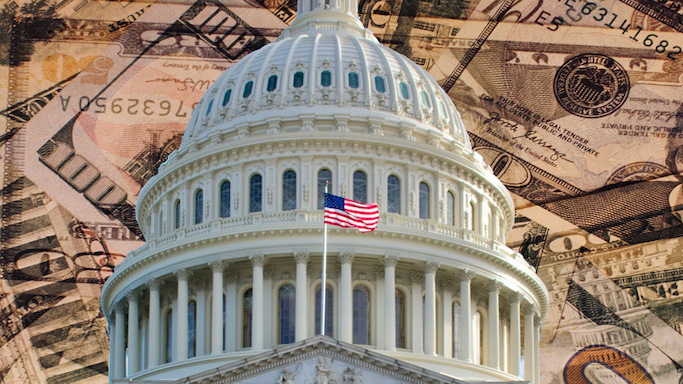Last Thursday, Treasury Secretary Janet Yellen announced that the U.S. had reached its debt limit. If lawmakers do not raise the debt ceiling, the U.S. will default on its debt.
The Biden administration has, so far, refused to negotiate with lawmakers, asking for a simple increase in the debt ceiling without conditions. Republicans must stand strong and demand that the ceiling only be raised if it is coupled with restraints on future spending.
In an interview with CNN, Yellen said, “It is simply about paying bills Congress has already authorized. … This is something you can’t negotiate over or bargain about.” Yellen described coupling spending restraints with a debt ceiling increase as a “very irresponsible thing to do.”
These statements display a gross sense of entitlement from the administration, are at odds with public opinion, and exhibit a fundamental misunderstanding about the dangers of a growing national debt.
Negotiation around debt ceiling increases is the precedent.
Secretary Yellen’s assertion that the debt ceiling is “something you can’t negotiate over or bargain about” is ripe with entitlement.
The Biden administration has riddled this country with reckless, wasteful spending. It is, in large part, this administration’s spending that has put us in a position to default on our debt. Now, you argue that it is Republicans’ “duty” to shield you from the consequences of your actions? Truly, Americans should be outraged by such a claim.
Certainly, it is instead Democrats’ duty to help correct their careless treatment of our economy.
Further, her claim is simply not true. Of course, you can negotiate on this matter. In fact, coupling spending restraints with debt ceiling increases is the precedent.
All eight major deficit-reduction laws since 1985 were tied to debt limit legislation. These pieces of legislation have, collectively, reduced spending by trillions of dollars. Clearly, we are due for more aggressive restraints on further spending.
About two-thirds of Americans support coupling a debt ceiling hike with spending restraints.
The American public is in support of negotiations, as outlined in a recent Harvard-Harris poll:
- 63% of Americans want Congress to raise the debt ceiling “only with constraints” on future spending. A whopping 46% of Democrats agree.
- 52% of Democrats believe their own party should cave on their “no negotiations” position.
- 66% of Americans say that Republicans should “hold out for spending constraints.”
This is unsurprising, as Americans are rightly concerned about the national debt:
- 65% of Americans say spending limits would help the health of the U.S. government.
- 56% of Americans say the Biden administration is spending too much money.
- 58% of Americans believe the Biden administration has been “reckless and loose in its spending” rather than “thrifty and strategic.”
The growing national debt is a dire problem, thus lawmakers must not pass up any opportunity to rein in spending.
According to Yellen, taking this opportunity to slow our ever-increasing debt is “irresponsible.” What is actually irresponsible is pushing the country further into debt without making any attempt at solving the problem at hand.
In 2021, the federal government spent $6.82 trillion, accounting for 30% of the nation’s economy. In 2022, the federal government spent $6.27 trillion. In just the last two years, Democrats rammed through over $3 trillion in partisan spending.
Now that the national debt has now exceeded $31 trillion, the U.S. holds over $246,000 of debt per taxpayer, just last year increasing the debt by approximately $11,374 per worker.
Among the many consequences of an out-of-control national debt are growing interest costs and inflation.
The Congressional Budget Office projects that U.S. interest costs will triple within the next decade, accounting for 12% of the entire federal budget. The cost of the federal government’s interest expenses could reach $1 trillion a year. In 2021, U.S. interest payments on its debt alone cost roughly $2,600 per household. Eventually, the federal government’s responsibility to pay growing interest costs will leave it incapable of paying for basic government duties.
Further, due largely to excessive government spending, inflation (and thus, higher interest rates) cost the average American household $7,100 last year, according to a report by the Heritage Foundation.
At this point, all spending restraint options are on the table.
While the Left would have you believe that Republicans are the ones being unreasonable, it is only the Biden administration that has drawn a hard line in the sand.
Last Friday, White House spokesperson Karine Jean-Pierre told reporters that they will not negotiate with lawmakers: “Like the president has said many times, raising the debt ceiling is not a negotiation; it is an obligation of this country and its leaders to avoid economic chaos,” she said. “Congress has always done it, and the president expects them to do their duty once again. That is not negotiable.”
Alternatively, Republicans have not made any hard demands about what spending restraints might look like, leaving the door open for bipartisan solutions. After all, lawmakers have until the summer to negotiate a responsible debt ceiling increase before a default on the debt.
Our current level of spending is unsustainable. We must take advantage of any opportunity to rein in debt, and now is lawmakers’ chance. Anything less would be a slap in the face to Americans.

